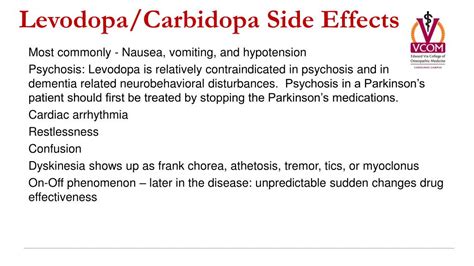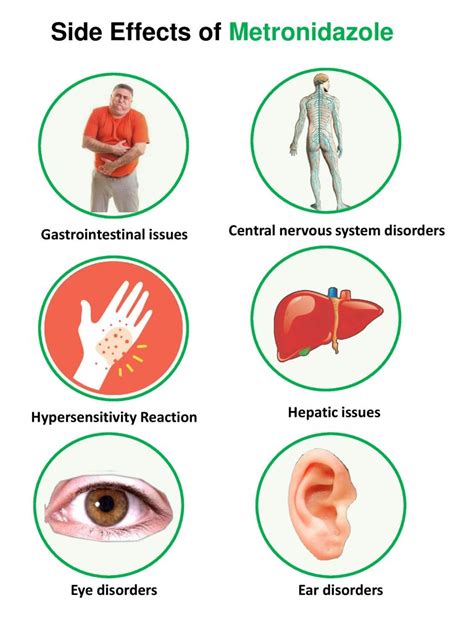Side Effects Carbidopa Levodopa

The combination of Carbidopa and Levodopa is a cornerstone in the treatment of Parkinson’s disease, a neurodegenerative disorder that affects movement. This medication is designed to increase the levels of dopamine in the brain, which is depleted in patients with Parkinson’s disease. While Carbidopa and Levodopa are effective in managing the symptoms of Parkinson’s, they can also cause a variety of side effects.
Common Side Effects
- Nausea and Vomiting: Many patients experience nausea and vomiting when first starting this medication. This side effect is often temporary and can be managed with adjustments in dosage or the addition of anti-nausea medications.
- Dizziness and Lightheadedness: Changes in blood pressure can lead to feelings of dizziness or lightheadedness, especially when standing up quickly. Patients are advised to rise slowly from a sitting or lying position.
- Headache: Headaches are a common side effect, possibly due to the changes in blood pressure or the increase in dopamine levels.
- Fatigue: Feeling tired or weak is another common side effect, which can be due to the medication itself or the progression of Parkinson’s disease.
- Mood Changes: Some patients may experience mood swings, anxiety, or depression as a result of the medication or the disease process.
Less Common but Serious Side Effects
- Dyskinesia: This refers to involuntary movements that can be a side effect of long-term use of Levodopa. Dyskinesias can manifest as twitching, jerking, or writhing movements.
- Hallucinations: Some patients may experience hallucinations, which can be visual, auditory, or a combination of both. This is more common in older adults or those with a history of psychiatric disorders.
- Impulse Control Disorders: A small percentage of patients may develop impulse control disorders, such as compulsive gambling, buying, or sexual behavior, due to the dopaminergic effects of the medication.
- Orthostatic Hypotension: A drop in blood pressure upon standing can lead to dizziness and fainting. Patients are advised to stay hydrated and rise slowly from sitting or lying down.
Rare but Serious Side Effects
- Neuroleptic Malignant Syndrome (NMS): A rare but life-threatening side effect characterized by high fever, stiffness, and changes in mental status. It requires immediate medical attention.
- Severe Allergic Reactions: Though rare, some patients may experience severe allergic reactions to Carbidopa and Levodopa, which can manifest as hives, itching, swelling, severe dizziness, or trouble breathing.
Management of Side Effects
Managing the side effects of Carbidopa and Levodopa involves a combination of medication adjustments, lifestyle changes, and monitoring by a healthcare provider. Patients are advised to report any side effects, especially if they are severe or interfere with daily activities. The goal is to find the optimal dosage that controls Parkinson’s symptoms while minimizing side effects.
Dietary Considerations
Diet can play a role in the management of side effects. For example, protein can interfere with the absorption of Levodopa, so patients may be advised to take their medication on an empty stomach or to adjust their protein intake. Staying hydrated can also help mitigate some side effects like dizziness.
Conclusion
While Carbidopa and Levodopa are crucial in the management of Parkinson’s disease, they come with a range of potential side effects. Understanding these side effects and working closely with a healthcare provider can help manage them effectively, leading to better symptom control and improved quality of life for patients with Parkinson’s disease.
What are the most common side effects of Carbidopa and Levodopa?
+The most common side effects include nausea, dizziness, headache, and fatigue. These side effects are often temporary and can be managed with adjustments in dosage or by taking the medication with food.
Can Carbidopa and Levodopa cause mood changes?
+Yes, some patients may experience mood swings, anxiety, or depression as a side effect of this medication. It’s essential to monitor mood changes and report them to a healthcare provider for appropriate management.
How can I minimize the side effects of Carbidopa and Levodopa?
+Minimizing side effects involves close monitoring by a healthcare provider, adjustments in medication dosage, dietary changes, and possibly the addition of other medications to counteract side effects. Staying hydrated and reporting any changes in symptoms or side effects promptly can also help.



